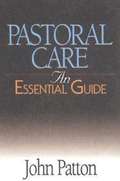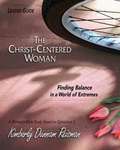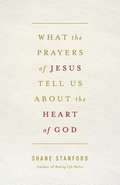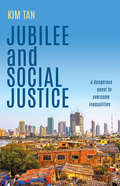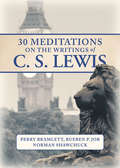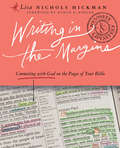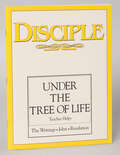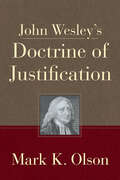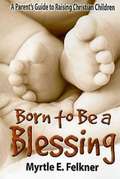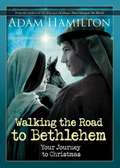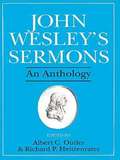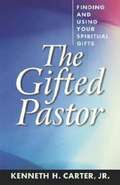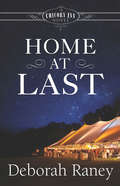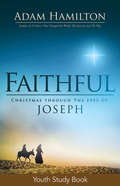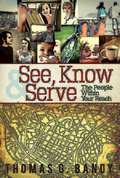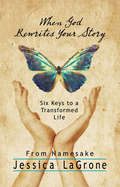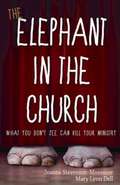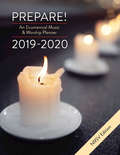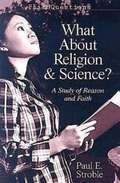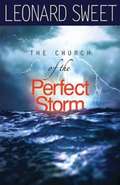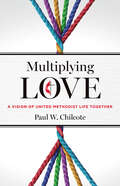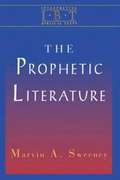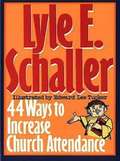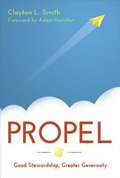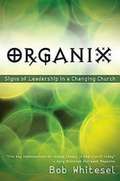- Table View
- List View
Pastoral Care: An Essential Guide
by John PattonThe essentials of pastoral care involve the pastor's distinctive task of caring for those who are estranged--the lost sheep. Taken from the biblical image of the shepherd, the pastor by virtue of his or her professional calling cultivates wise judgment in order to hear the hurting and offer guidance, reconciliation, healing, sustaining presence, and empowerment to those in need. This book will outline the quintessential elements pastors need to wisely minister in today's context by discussing four major kinds of lostness: grief, illness, abuse, and family challenges. The purpose of the Abingdon Essential Guides is to fulfill the need for brief, substantive, yet highly accessible introductions to the core disciples in biblical, theological, and religious studies. Drawing on the best in current scholarship, written with the need of students foremost in mind, addressed to learners in a number of contexts, Essential Guides will be the first choice of those who wish to acquaint themselves or their students with the broad scope of issues, perspectives, and subject matters within biblical and religious studies.
The Christ-Centered Woman - Women's Bible Study Leader Guide: Finding Balance in a World of Extremes (The Christ-Centered Woman)
by Kimberly Dunnam ReismanIn this six-week in-depth Bible study, Kimberly Dunnam Reisman draws upon her bestselling book The Christ-Centered Woman to provide a completely updated and expanded guide for helping women to find balance at every age and stage of life. Confronting the daily chaos of competing demands from a new perspective, she asks not "How do I juggle my responsibilities?" but "How do I make choices that reflect my relationship with Christ and his direction for my life?" Using chapter three of the Apostle Paul’s letter to the Ephesians as a biblical foundation, the study identifies barriers to balanced living and explores what the Bible teaches about Christ-centered living. Women will discover how being centered in the Savior can help us contemplate, sort, and prioritize our callings. Through it all we come to experience Christ as Rock, Solace, and Guide and find him the calm center from which we can wisely navigate the responsibilities of our lives. The Leader Guide contains six session plan outlines, complete with discussion points and questions, activities, prayers, and more—plus leader helps for facilitating a group. Other components for the Bible study, available separately, include a Participant Workbook, Leader Guide, DVD with six 21-26 minute sessions featuring closed captioning, and boxed Leader Kit.
What the Prayers of Jesus Tell Us About the Heart of God
by Shane StanfordMore than any other part of his ministry, Jesus’ prayers inform andengage his intentions for how the gospel would change lives and affectthe world. When we take time to review the moments when Jesus prayedwith his disciples or went away to pray alone, we engage both a storyand a set of lessons. Jesus doesn’t just pray as a means to be with theFather; he uses prayer as an instructional. Discover Jesus’ own hopesand desires when he prayed for us toHave a relationship with the FatherBe shaped by God’s wisdom and guidanceBe united with one anotherBring glory to GodHave consistency in our spiritual life What the Prayers of Jesus Tell Us About the Heart of God refines ourunderstanding of Jesus’ plans for his disciples (both in that firstcentury and for every century to follow). By witnessing even the mostintimate moments between the Father and the Son, we can learn somethingabout the big plan God has for our lives.
Jubilee and Social Justice: A Dangerous Quest to Overcome Inequalities
by Tan, Kim“Impact Investor” Kim Tan challenges the church to ask whether or not the gospel as we interpret it today really embodies the jubilee vision of the Bible. Imagine a group of forty adults living in a community, assisting each other to buy houses, sharing material wealth and releasing the surplus to help others as a practical outworking of the biblical principles of jubilee. Kim Tan was part of this group who defined principles of sacrificial generosity, stewardship, and social holiness.This book is in two parts. First it walks through the Old Testament on the Jubilee program as given in the covenant to Israel at Mt. Sinai. An idealistic vision was followed by the failure of Israel to practice this teaching. We trace the Jubilee practices in the New Testament through the early Church and later Church history. The second part focuses on modern expressions of Jubilee as it has caught the imagination of various individuals and groups working out different aspects of the Jubilee in their lives. Modern expressions of the biblical Jubilee include: 1. Communities sharing goods2. Wealth creation & distribution3. Cancellation of debt4. Feeding the widows5. Set the captives free6. Stewarding the environment
30 Meditations on the Writings of C.S. Lewis: 30 Daily Reflections
by Norman Shawchuck Perry Bramlett Bishop Rueben P. JobA number of years ago, friends and coauthors Bishop Rueben P. Job, Perry Bramlett, and Norman Shawchuck created together a spiritual reader pairing a collection of quotes from beloved author C.S. Lewis with their own unique spiritual reflections. After their deaths, their work was recovered and Abingdon is excited to share this story and this beautiful book posthumously with those looking for daily inspiration from excellent and thoughtful Christian writing.30 Meditations on the Writings of C. S. Lewis combines three strong spiritual voices writing on topics of grief, joy, fear, loss, salvation, and love for today’s readers inspired by quotes from C.S. Lewis.The collection of thirty devotions begins each day with a short quote from Lewis followed by a reflection from Job, Bramlett, or Shawchuck in a beautifully designed book. This collection is perfect for starting any time of the year and is an excellent gift for the C.S. Lewis fan in your life.
Writing in the Margins: Connecting with God on the Pages of Your Bible
by Lisa Nichols HickmanNo other time-honored spiritual practice is as immediate, raw, andengaged with Scripture as writing--responding to God--in the margins ofthe Bible. Composers like Bach to theologians like Barth, botanists andsaints--all have written their thoughts directly in their Bibles. Indoing so they engaged their fullest selves with our most significanttext.Some people have lived with Scripture all their lives and yet feelestranged from it. This book inspires a new encounter with "the livingWord"--and jump-starts a deep, creative, and hands-on approach toreading Scripture.As you sit, with pencil, pen, crayon, or marker in hand and Bible inlap, at whatever edges of life you are living within, now thatinvitation is yours. The creative practice of writing in the marginscreates a divine conversation that transforms and guides. Meet God inthe margins. Let God shape your character from the living interaction onthe pages of your Bible.Writing in the Margins is a book about making connections onthe pages of your Bible--and introduces a devotional and scriptural pathof engagement that is life-changing.
Disciple IV Under the Tree of Life: The Writings - John - Revelation (Disciple Ser.)
by VariousDISCIPLE IV: Under the Tree of Life, is the final study in thefour-phase DISCIPLE program and is prepared for those who have completedDisciple I: Becoming Disciples Through Bible Study. The studyconcentrates on the Writings (Old Testament books not in the Torah or theProphets), the Gospel of John, and Revelation.Emphasis on the Psalms as Israel’s hymnbook and prayer book leads naturallyto an emphasis on worship in the study. Present through the entire study is thesense of living toward completion – toward the climax of the message and thepromise, extravagantly pictured in Revelation.The image of the tree and the color gold emphasize the prod and promise inthe Scriptures for DISCIPLE IV: Under the Tree of Life. The wordunder in the title is meant to convey invitation, welcome, sheltering,security, and rest – home at last.Commitment and Time Involved 32 week study three and one-half to four hours of independent study each week (40 minutes daily for leaders and 30 minutes daily for group members) in preparation for weekly group meetings. Attendance at weekly 2.5 hour meetings.Teacher HelpsThe Teacher Helps provides an outline foran orientation session and process suggestions for each of the weekly groupsessions. It does not contain new or additional content for the leader topresent to the group. A one-page teaching plan is provided for each session.Weekly group sessions follow a set patter, with designated amounts of time foreach step. Suggestions for group activity are specific and clearly related tothe Scripture being studied. Ample questions for use in discussion are included.The leader both guides the process and participates in all small- groupactivities in the weekly group session.Leaders will find detailed information and instructions on making necessaryarrangements for and preparing group members to participate in three potentiallylife-changing experiences at the conclusion of Under the Tree of Life –a video-led worship experience of the book of Revelation in Session 31 and aservice of foot washing and a service of Holy Communion in Session 32.In the front of the teacher helps is a section of general information oneffectively using the study manual, preparing to lead the weekly group meeting,following the proper schedule and procedure, tips for leading discussion, andsuggestions for creating and maintaining a caring climate in the studygroup.Process suggestions in the teacher helps enable fullparticipation by all members of the group as a result of disciplined dailystudy. A one-page plan for each of the weekly group sessions follows anestablished schedule and procedure, with an amount of time designated for eachsection in the plan. Each session plan includes suggestions for group study of aselected passage of Scripture.
John Wesley's Doctrine of Justification
by Mark. K. OlsonJohn Wesley’s Doctrine of Justification provides updated scholarship on this pivotal doctrine of Methodism, providing a deeper understanding of a major tenet of the Christian faith. Mark Olson offers a comprehensive treatment of the development and exposition of Wesley’s doctrine of justification and how it changed throughout Wesley’s life, including his early views rooted in Anglican heritage, the significant developments in Wesley’s career, and contributions from notable figures like John Fletcher to his doctrine of general justification.The doctrine of justification was pivotal to John Wesley’s understanding of a person’s relationship with God. In Wesley’s view, it defined one of the two general parts of salvation. It touched every aspect of the spiritual journey from birth (general justification) to conversion (present justification) to final judgment and glory (final justification). To properly understand Wesley’s via salutis and theology, one needs to grasp the particulars of his doctrine of justification. The best way to do this is to tell the story of how he came to understand the doctrine over the course of his life. It is a complex story, with many twists and turns, that deserves to be fully told.
Born to Be a Blessing: A Parent's Guide to Raising Christian Children
by Myrtle FelknerEvery child is born to be a blessing. Many parents experience overwhelming love when their children are born, and strive to raise their children to experience a relationship with God through Jesus Christ. This guide for parents enables them study, learn, and grow together to find answers to shared questions and concerns as they raise their children. Parents will deal with many areas of children's lives such as self-control, truth-telling, sibling rivalry, generosity, and making faithful decisions. Perfect for small groups, each session includes Scripture, plus stories, and questions for meditation and discussion. Parents learn new tools to respond to their children in positive, Christ-like ways, and gives them the courage to face one of the most blessed jobs of all -- raising Christian children.
Walking the Road to Bethlehem: Your Journey to Christmas (The\journey Ser.)
by Adam HamiltonBased on Hamilton's, The Journey: Reflections for the Season, this new edition contains added content to create an experience of preparation of heart and mind for Christmas. Experience the Nativity story in new ways as you take your own journey to Christmas. Walking the Road to Bethlehem combines content from Adam’s travel from Nazareth to Bethlehem, a summary of the historical and scriptural content from each chapter of The Journey, links to travel video and photographs online, Scripture, prayers and room for personal journaling. Walking the Road to Bethlehem is excellent for individual devotion and reflection and can also be used as a small group experience.
John Wesley's Sermons: An Anthology
by Albert C. OutlerAdapted from Albert Outler's 4-volume text The Works of John Wesley, this anthology of 50 of Wesley's finest sermons. Arranged chronologically with introductory commentary by Richard Heitzenrater.
The Gifted Pastor: Finding And Using Your Spiritual Gifts
by Kenneth H. Carter Jr.Carter writes a piece which will stir the sympathies of pastors thwarted by their own efforts to emulate a congregation's successful predecessor. Within months, these pastors see little success as fatigue and burn-out set in. All Christians are graced with specific and distinctive spiritual gifts. Too often pastors forget that God has given them particular gifts for ministry. While all pastors must attend to the different tasks of congregational ministry, they need to discover those functions for which they have been particularly gifted. When they begin to make these gifts the focus of their ministry, then deep personal satisfaction and connection with others results. This book is written to help pastors overcome the false belief that if their ministry is to succeed, it must emulate that of a high-profile orator. Carter explains that when we make our distinctive gifts the center of our ministry, we lose the illusion that we are in control, and instead trust that God will complement us with others' gifts to meet the needs of God's people. Key Features: includes a "consumer guide" to spiritual gift inventories; resource lists including retreat centers, congregations, and publications. Key Benefits: Provides pastors a biblical/theological framework for understanding ministerial gifts.
Home At Last: A Chicory Inn Novel Book 5 (A Chicory Inn Novel)
by Deborah RaneyLink Whitman has settled into the role of bachelor without everintending to. Now he’s stuck in a dead-end job and, as the next Whitmanwedding fast approaches, he is the last one standing. The pressure fromhis sisters’ efforts to play matchmaker is getting hard to bear as Linkpulls extra shifts at work, and helps his parents at the Chicory Inn.All her life, Shayla Michaels has felt as if she straddled two worlds.Her mother's white family labeled her African American father with namesShayla didn't repeat in polite––well, in any company. Her father’sfamily disapproved as well, though they eventually embraced Shayla astheir own. After the death of her mother, and her brother Jerry’sincarceration, life has left Shayla's father bitter, her niece, Portia,an orphan, and Shayla responsible for them all. She knows God loves themall, but why couldn't people accept each other for what was on theinside? For their hearts?Everything changes one icy morning when a child runs into the street andLink nearly hits her with his pickup. Soon he is falling in love withthe little girl’s aunt, Shayla, the beautiful woman who runs Coffee’sOn, the bakery in Langhorne. Can Shayla and Link overcome society’s viewof their differences and find true love? Is there hope of changing thesometimes-ugly world around them into something better for them all?
Faithful Youth Study Book: Christmas Through the Eyes of Joseph (Faithful)
by Adam HamiltonIn this study, you will understand how Joseph's place in the nativity story is much like our own. In life, we encounter circumstances that we would have never chosen for ourselves. At times it can be tempting just to walk away. Joseph provides us a great example of humbly obeying God even when we don't understand and faithfully moving forward in the strength that God provides.Exchange your doubt for courage this Advent and Christmas season. Learn to accept and glorify God's will even when circumstances make it difficult to do so.This Youth Study Book takes the ideas presented in Adam Hamilton's book and interprets them for young people grades 6-12.
See, Know & Serve the People Within Your Reach
by Thomas G. BandyIn See, Know & Serve, Tom Bandy shows how the transition between Christendom and Post-Christendom is unfolding at different speeds and with different twists in diverse regions and places, and that this development makes standardizing ministry practices, or using collections of "best practices," unsuccessful in growing God's mission. Bandy presents startlingly new ways to view congregations and communities, enabling leaders to understand the people within their reach on a granular level. The author demonstrates with real-world examples how organizations can translate this information into practical strategies and tactics. The book includes helpful charts and diagrams, making the material surprisingly easy to digest and share. This important, groundbreaking and convicting book lays out with depth and clarity a pioneering new way forward for every church and every mission-focused organization. Bandy shows how we can see the people in our communities with unparalleled clarity, so that we can serve them—fulfilling our mission—effectively.
When God Rewrites Your Story: Six Keys to a Transformed Life from Namesake Women's Bible Study (The\rewritten Life Ser.)
by Jessica LaGroneThis mini book with devotional reflections from the Bible study Namesake introduces you to biblical characters who met God and were never the same again. Through their stories, learn about God’s transformative power and how He wants to be as intimately involved in your story, offering an identity that shines with the purpose for which you were created.
The Elephant in the Church: What You Don't See Can Kill Your Ministry
by Mary Lynn Dell Jeanne Stevenson-MoessnerA church can be a dangerous place. The perils may be so obvious, they become “elephants” standing in the fellowship hall, lurking in the sanctuary, ready to spring into the pastor’s study, and tromp out of the choir room. The word “elephant” stands for an obvious truth or issue that is ignored or unnamed—a blind spot. Yet we allow elephants to occupy a large amount of space in the minds and hearts of those that tiptoe around them. Discussing common blind-spots of congregations and church leaders, the authors provide examples and illustrations for how to stop these "elephants" from ruining a ministry.
Prepare! 2019-2020 NRSV Edition: An Ecumenical Music & Worship Planner
by David L. Bone Mary ScifresAn all-in-one resource that helps both the music director and pastor plan the worship services for each Sunday and holy day of the church year, the 2019-2020 edition Prepare! is lectionary based and places everything at your fingertips: Calendar format that helps you plan the entire choir year, from September through August. Eight or more suggested hymns for each service keyed to 16 hymnals from at least 7 different denominations, including: Africana Hymnal, The Baptist Hymnal, Chalice Hymnal (Disciples of Christ), The Faith We Sing, Glory to God: The Presbyterian Hymnal, The Hymnal 1982 (Episcopal), Hymns for the Family of God, Lutheran Book of Worship, The Presbyterian Hymnal, The New Century Hymnal (United Church of Christ), Renew! Songs & Hymns for Blended Worship, Songs for Praise and Worship Singalong Edition, The United Methodist Hymnal, Voices United, Worship & Song, and Worship III (Roman Catholic). Complete lectionary text of the Old Testament, Psalm, Epistle, and Gospel readings, using the New Revised Standard Version of the Bible. Reproducible worship planning forms. Resources for holidays and special days. Suggestions for prayers, solos, anthems, visuals, and much more. Also available with CEB texts.
FaithQuestions - What About Religion and Science?: A Study of Reason and Faith (FaithQuestions)
by Paul E. StrobleThis book invites us to consider ways to remain confident in our faith as we understand and appreciate the discoveries and advances of science. How can Christians integrate, believe, or accept all the teachings of science, the Bible, and Christian tradition? How can we believe in both the discoveries of science and the Bible? Are science and religion compatible or incompatible? Does the Christian understanding that God created the universe exclude the findings and discoveries of science? What is the role of faith in the world of education? What can we believe about intelligent design? If we believe in evolution, can we believe in God? Does the Big Bang theory exclude God? If we are Christians, can we support stem-cell research and cloning? Can science help us understand the afterlife? Does science negate or support prayer? What is the difference between faith and reason? Do they exclude or complement one another? As Paul Stroble addresses these questions and others, he helps us examine different possible ways that religion and science relate to each other and ways that science and religion provide meaning and value in our lives. PAUL STROBLE is an elder of the Illinois Great Rivers Conference of The United Methodist Church. He has served both as parish pastor and college instructor and currently teaches at the University of Akron, where he earned an Excellence in Teaching award. He is a long-time writer-researcher for the United Methodist curriculum FaithLink and author of numerous articles and curricular materials. Among his eleven books are Paul and the Galatians and What Do Other Faiths Believe? He is married to Dr. Beth Stroble, and they have a daughter, Emily. The FaithQuestions study series is designed to meet the needs of people who have questions about the Christian faith and who desire a deeper engagement with scripture and with discipleship as they explore studies of issues in theology, ethics, missions, Bible interpretation, and church history. It seeks to equip a new generation of church leaders to appreciate the eternal message of the gospel and to develop the skills to articulate its relevance in our contemporary context. The series would be a good choice for users who have completed Disciple. this will be the ninth study in the series, following What About the Rapture -What Do Other Faiths Believe - What Happens When We Die -What About Divine Healing - What About the Trinity - What About Forgiveness- What About the Devil - What About Reading the Bible
The Church of the Perfect Storm
by Leonard SweetThe church is heading into a “perfect storm” of cultural forces. Will you sink beneath the waves, or ride the winds of the Spirit?An array of cultural forces is coming together to present the church with unprecedented challenge and unequaled opportunity. Such “category 5" realities as postmodernism, postChristendom attacks on belief in God, and the threat of global warming have coalesced to make a “perfect storm” that will leave people uncertain of their place in the world, and all they have previously believed in. Like the disciples when Jesus calmed the storm, the church can cower and cry out for relief. Or, when everything is spinning and whirling in the wind, the church can go out to meet the storm, embrace the gale, . . . and pass out kites.From the Circuit Rider review: "Like other books Sweet has written and compiled, The Church of the Perfect Storm is thought-provoking and compelling. The material flows in such a way that allows readers to grasp the gravity of the situation. However, as with most futuristic material, there is also a sense in which readers may want to know: 'Okay, now what? Where do we need to steer this ship? Are mainline and evangelical churches so off-course as to fail to weather the rising tides that are here and soon coming?' Readers of this volume may enjoy the description of a post-Christendom world, but they may also want to know more about the prescription for the days ahead. (Click here to read the entire review.)
Multiplying Love: A Vision of United Methodist Life Together
by Paul W. ChilcoteA Vision of United Methodist Life Together.Our world needs love during these desperate days of radical polarization and division. Our United Methodist churches yearn to embrace love more completely because God first loved us. Our “faith” (including doctrine) is important; Christian “hope” (including renewal) is important; “love” of God and neighbor is more important. Multiplying Love underscores what matters most and stands in contrast to divisive misreadings of essential Methodist teachings. Chilcote helps us embrace anew the Wesleyan vision of love of Jesus as central to what we believe and how we live.When I finished Multiplying Love, I found myself jumping up and down shouting, “Yes, yes, yes! Gosh, do we need this!” We are at a remaking moment in the church. Dr. Chilcote beautifully articulates the deeper theological vision that beckons and sustains us. Multiplying Love helped me more thoroughly embrace the kind of loving people we are hoping to become. That’s what it’s all about to me, and this book nails it!—Rev. Christy Allen Holden, co-creator of The Channel UMC, a new hybrid community of faith (@christyallenholden)Every United Methodist pastor would do well to invite their church council to read Paul Chilcote’s brief and powerful Multiplying Love. It recalls the power of the Wesleyan approach to the gospel and makes a compelling case for the future of The United Methodist Church. I loved this book!—Rev. Adam Hamilton, Kansas pastor and author of Wrestling with Doubt, Finding Faith
The Prophetic Literature: Interpreting Biblical Texts Series (Interpreting Biblical Texts)
by Marvin A. SweeneyBiblical StudiesBiblical texts create worlds of meaning, and invite readers to enter them. When readers enter such textual worlds, which are often strange and complex, they are confronted with theological claims. With this in mind, the purpose of the Interpreting Biblical Texts series is to help serious readers in their experience of reading and interpreting by providing guides for their journeys into textual worlds. The controlling perspective is expressed in the operative word of the title--interpreting. The primary focus of the series is not so much on the world behind the texts or out of which the texts have arisen as on the worlds created by the texts in their engagement with readers. Although these books of the prophets are based upon the careers and experiences of some of the most talented and provocative individuals of their times, the books must be read first as literature. Each book displays its own unique organization, literary characteristics, and theological outlook in presenting the prophets. In the case of Jeremiah, interpreters must even consider two distinctive forms of the book in the Hebrew Bible and the Greek Septuagint. By guiding the reader through the literary structure and language of each of the prophetic books as well as the social roles of the individual prophets, this volume opens the reader to greater understanding and appreciation of the prophets of Israel and Judah."Fact packed and crystal clear, Marvin Sweeney’s Interpreting Biblical Texts: The Prophetic Literature invites readers to tour the landscape of ancient Israel’s Latter Prophets corpus. Sweeney serves as a first-rate guide, equipping readers with basic knowledge to grasp, and grapple with, the literary legacies of the canonical prophets. True to the series title, he interprets texts with an eye to major, dynamic themes in Jewish and Christian traditions. The volume proves a reliable guidebook for readers wishing not only to survey, but also to engage in dialogue with, ancient Israel’s canonical prophets."Katheryn Pfisterer Darr, Professor of Hebrew Bible, Boston University"The aim of the series Interpreting Biblical Texts is pedagogical. This well-written, easy to follow, and coherent book serves its purpose well. More importantly, it certainly invites and guides its readers in the enterprise of interacting with the prophetic books in a way that is informed by recent, academic scholarship on this literature."Ehud Ben Zvi, History and Classics & Interdisciplinary Program of Religious Studies, University of Alberta"This is a new and interesting approach to the prophetic literature, which will be illuminating for theological reflection in our own post-Holocaust era." John J. Collins, Holmes Professor of Old Testament, YaleMarvin A. Sweeney is Professor of Hebrew Bible, Claremont School of Theology, and Professor of Religion at Claremont Graduate University.
44 Ways to Increase Church Attendance
by Lyle E. SchallerAre you still suffering over the sight of empty pews? Have your efforts been more than exhaustive in expanding your congregation? Have you maximized your brainstorming potential for bringing in new members? If you have reached what appears to be your limit, then no longer fret, 44 Ways To Increase Church Attendance can open the doors of both your church and mind. With proven techniques for building a body for Christ, church leaders can increase their membership and then free themselves to focus on other important missions for God. Schaller's suggestions will energize leaders and put their churches on the road of abundance.
Propel: Good Stewardship, Greater Generosity
by Clayton L. SmithPastors and other church leaders often feel ill-equipped in the critical area of stewardship and giving. Propel: Good Stewardship, Greater Generosityfills that need by offering a comprehensive course in churchstewardship for the pastor, stewardship leader, or seminarian. AuthorClayton Smith gives clear instructions for the organization andimplementation of annual campaigns, planned giving programs, memorialgifts, and much more. He offers an extraordinary depth and breadth ofpractical information along with the wisdom that comes with decades ofreal church leadership experience."Everypastor should have a copy of Propel readily at hand all year long. It isas complete a guide to all phases of Christian financial stewardship asexists today. I highly recommend it because of the excellent contentbut also because of the author. Clayton Smith has been a student offinancial stewardship all his life. I am thrilled that now others maylearn from him. I wish I had this book forty years ago when I startedout. Propel will make a difference in your ministry!" —J. Clif Christopher, President and CEO, Horizons Stewardship Company"Asleaders, we often know we must do something differently, but we are notsure what or how. Clayton Smith propels us forward. This amazingresource identifies the many wayswe can lead our congregations into abright future. Smith’s strategies and methods for generosity apply toevery church leader, any size church, and all denominations. This ismore than a stewardship or finance book. It helps build a culture inwhich Christians can become the generous people they are intended tobe." —Donald W. Joiner, Director of Operations and Stewardship, General Board of Discipleship"Propeldemystifies the practices of generosity and stewardship in localcongregations. It is both a scholarly guide for pastors and a detailedhandbook for lay leaders. Smith covers giving of all varieties andoffers proven techniques that work in churches of all sizes andcontexts. Propel is a valuable guide for every leader, clergy or lay,who sees generosity as an inescapable element of Christiandiscipleship." —Byrd L. Bonner, AIF, President, United Methodist Church Foundation"Clayton Smith in his wonderful book Propel: Good Stewardship, Greater Generosity, describes six different ways to help people grow in their giving." —Margaret Marcuson, Marcuson Leadership Circle
Organix: Signs of Leadership in a Changing Church
by Bob WhiteselDoes your leadershipstyle fit new ways of doing church--leadership that is organic and elasticand that finds ways to seize God-given opportunities? Looking back anddrawing on the ancient Christian tradition, Bob Whitesel describes seven traitsfor successful leadership, which he characterizes by seven symbols:O (the Greek symbol theta) – the firstletter of the Greek word theosstresses that God is the source of the burden for others and provides the powerto help them.Rx (the medical prescription symbol) – an emphasis on addressing the spiritual and physical health of leaders.G (a stylized “G” for “graffiti”)– the edgy, colorful, and artful collages that help define contemporaryorganizations.A (inspired by the recyclesymbol) – the idea of recycling places, experiences and people rather thandiscarding them.N - emerging networks thatc9onnect people more quickly, efficiently, precisely and continuously.I - an emphasis on “incarnation”,a going “in the flesh” to serve others rather than sending surrogates.X (the Jerusalem crosswith a number in each quadrant) – four types of measurement observed inJerusalem (Acts 2:42-47), which at their core point to Christ’s work on thecross.Taken together, these symbols spell out the word “organix” and represent a fundamentally new way to think about your church and how you can best lead.
